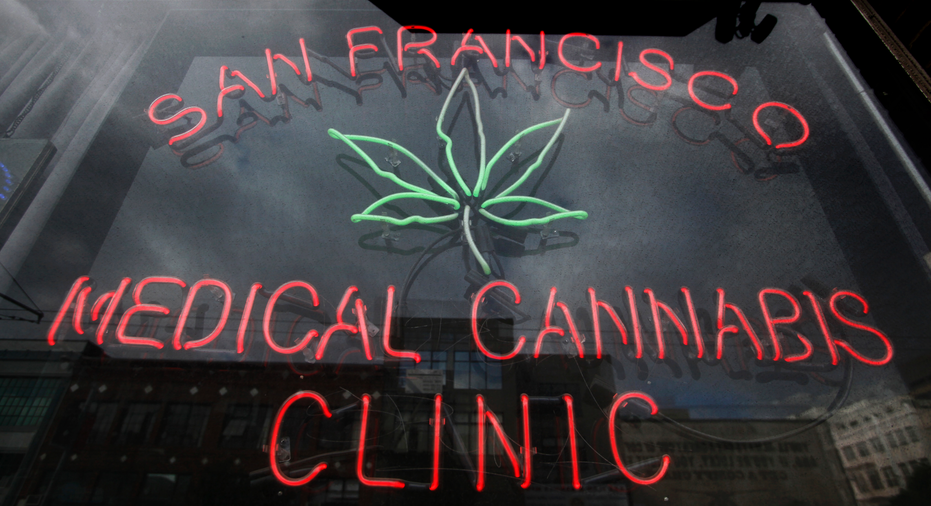San Francisco's love of neighborhood input slowed legal pot

SAN FRANCISCO – San Francisco officials adopted recreational marijuana rules favored by pot advocates, but not without heated discussions over local control in a tightly packed city where neighborhoods differ wildly in politics and character.
The San Francisco Board of Supervisors rejected attempts Tuesday to mandate a larger barrier between schools and pot shops as well as provisions allowing neighborhoods to limit the number of dispensaries or ban them outright.
The move could allow sales to start the first week of January, just after recreational pot becomes legal across California. But it had been surprisingly difficult for the pot-friendly city to adopt local rules required for growers and retailers to get a state permit to sell the drug.
San Francisco embraces its marijuana culture, celebrating the annual 4/20 holiday with a group smoke-out on Hippie Hill in Golden Gate Park, near the head shops of Haight-Ashbury district. Scoring a medical marijuana card to buy pot is cheap and easy.
Yet the city also deeply values neighborhood input. A well-organized group of Chinese immigrants strongly opposed to marijuana had lobbied supervisors for larger buffer zones and neighborhood prohibitions that pot advocates said would strangle the industry.
The board approved a 600-foot (180-meter) buffer between pot shops and schools, rejecting attempts by Supervisor Katy Tang, who represents a heavily Asian district, for a 1,000-foot (305-meter) barrier. She also wanted the barrier to apply to child care centers.
She said she was confused by dual messages about marijuana: Is it a harmless product or something that should not have a heavy presence in neighborhoods, like liquor stores?
"I just feel this huge push and pull between, well, it's harmful if there's so many in this one area but at the same time, they're not going to harm kids or youth," Tang said.
On the other end was Supervisor Hillary Ronen, who urged the board to strike down a rule that retail pot shops be separated by 600 feet (183 meters), saying the city should make it easier for entrepreneurs in a city as notoriously expensive as San Francisco.
"I'm just shocked by my colleagues, quite frankly, on this board, and I don't understand why we're pretending that this is so dangerous for children," she said.
San Francisco will not be ready for sales New Year's Day, but if Mayor Ed Lee approves the rules quickly, the city could be open for recreational pot at midnight Jan. 5, said John Cote, spokesman for the city attorney's office.
For that to happen, Lee would need to sign the legislation Dec. 5 after the board votes on it a second time. Spokeswoman Ellen Canale said he will sign when it comes to his desk.
The city has more than 40 authorized medical marijuana outlets that can start selling recreational weed in the new year. The bulk of them are clustered in the city's gritty South of Market district near downtown.
One supervisor voted against the regulations, saying that the board had not had enough time to hash out sensitive issues, such as neighborhood input and local zoning.
"I do fundamentally believe that we should allow the districts to determine how this is, and the voters of California didn't say we were going to put a (dispensary) on every corner," Supervisor Ahsha Safai said. "There's no issue with access in this city."
The board agreed to "equity" provisions that give permitting preference to marijuana businesses that commit to hiring locally and mentoring people from communities hit hard by the country's war on drugs.
The idea is to diversify the industry so minorities, veterans and other traditionally disadvantaged groups can share in what is sure to be a lucrative business, the board said.
"It's a temporary feeling of relief," Supervisor Malia Cohen said Wednesday. "We just created the parameters and the guidelines. I think the real work is going to be on the implementation side."
Pot advocate Patricia Barraza rallied before Tuesday's meeting, saying weed could be a major economic driver, particularly for people finding it hard to stay in pricey San Francisco.
"Your family can live in this city and thrive in this city by having your own business, it just happens that cannabis is the way to do that right now," she said.
But Ellen Lee, a social worker who helped organize cannabis critics, said some people cried after learning they had lost.
"No matter what we do, we concluded they are not listening to us," she said.



















